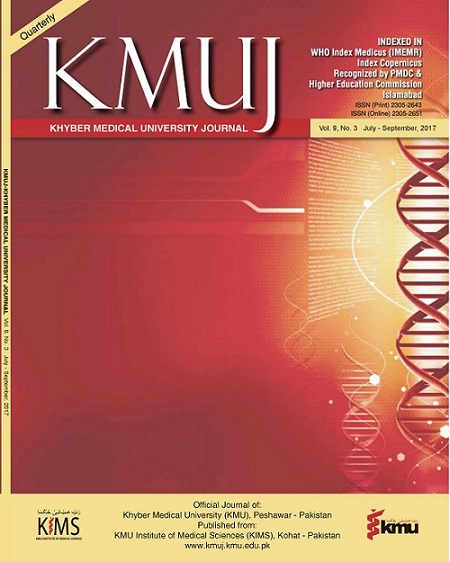THE IMPACT OF LEARNING PHARMACOLOGY ON PRACTICE OF SELF-MEDICATION AMONG MEDICAL STUDENTS OF SHEIKH ZAYED MEDICAL COLLEGE, RAHIM YAR KHAN, PAKISTAN
Main Article Content
Abstract
ABSTRACT
OBJECTIVE: To study the impact of learning pharmacology on the practice of self-medication among medical students.
METHODS: This questionnaire based cross sectional study was conducted on 674 medical students of Sheikh Zayed Medical College, Rahim Yar Khan, Pakistan at the end of their curriculum from Oct to Dec 2016. Group-A comprised of 318 students of 1st and 2nd year while Group-B comprised of 356 students of 3rd and 4th year.
RESULTS: The mean age of the students in group-A was 20±1.8 years and in group-B it was 22±2.2 years. The prevalence of self-medication in group-A and group-B was 285/318 (89.62%) and 305/356 (85.67%) respectively. Main reasons for self-medication were time-saving, mild-illness and quick relief (p<0.05). Commonly used drugs in both groups were analgesic 240/318 (75.47%) in group-A and 265/356 (74.43%) in group-B, antipyretic 222/318 (69.81%) in group-A and 242/356 (67.97%) in group-B, antacids 215/318 (67.61%) in group-A and 224/356 (62.92%) in group-B. However, 3rd and 4th year students used antibiotics, anxiolytics and multivitamins twice as compared to 1st and 2nd year students (p<0.05). Awareness about self-medication practices in terms of dosage, duration of treatment, adverse effects, precautions, drug interactions was quite high in group-B as compared to group-A (p<0.05). Similarly, group-B also was aware of over-the-counter drugs, expiry of drug and reading leaflet instruction (p<0.05).
CONCLUSION: The practice of self-medication was not much different in senior and junior medical students; however, senior medical students were more concerned about the rationale use of drugs after learning pharmacology.
KEY WORDS: Learning (MeSH); Pharmacology (MeSH); Medical Students (MeSH); Self-Medication (MeSH).Article Details
Work published in KMUJ is licensed under a
Creative Commons Attribution 4.0 License
Authors are permitted and encouraged to post their work online (e.g., in institutional repositories or on their website) prior to and during the submission process, as it can lead to productive exchanges, as well as earlier and greater citation of published work.
(e.g., in institutional repositories or on their website) prior to and during the submission process, as it can lead to productive exchanges, as well as earlier and greater citation of published work.
References
REFERENCES:
World Health Organization. Guidelines for the regulatory assessment of medicinal products for use in Self-medication, WHO 2000. [Cited on April 25, 2017]. Available from URL: http://apps.who.int/iris/bitstream/10665/66154/1/WHO_EDM_QSM_00.1_eng.pdf
Bennadi D. Self-medication: A current challenge. J Basic Clin Pharm 2013;5(1):19-23. Doi: 10.4103/0976-0105.128253.
Fainzang S. Managing medicinal risks in self-medication. Drug Saf 2014 May;37(5):333-42. Doi: 10.1007/s40264-014-0153-z.
Yadav S, Rawal G. Self-medication practice in low income countries. Int J Pharmaceut Chem Anal 2015;2(3):139-42.
Hussain A, Malik M, Toklu HZ. A literature review: pharmaceutical care an evolving role at community pharmacies in Pakistan. Pharmacol Pharm 2013;4(05):425–30. Doi: 10.4236/pp.2013.45060
Hughes CM, McElnay JC, Fleming GF. Benefits and risks of self-medication. Drug Saf 2001; 24(14):1027–37.
World Health Organization. Report of the WHO Expert Committee on national drug policies. Contribution to updating the WHO guidelines for developing national drug policies. Geneva: WHO. 1995.
Ruiz ME. Risks of self-medication practices. Current Drug Saf 2010;5(4):315-23.
Trevor AJ, Katzung BG, Masters SB, Kruidering-Hall M. Pharmacology examination & board review, 11e. New York: McGraw-Hill; 2015.
Abubakar AR, Haque M. Pharmacovigilance Practice: The Current Challenges and the Gaps in the Medical Students’ Curriculum. J Appl Pharm Sci 2016;6(05):210-5.
Pandya RN, Jhaveri KS, Vyas FI, Patel VJ. Prevalence, pattern and perceptions of self-medication in medical students. Int J Basic Clin Pharmacol 2013;2(3):275-80.
Klemenc-Ketis Z, Hladnik Z, Kersnik J. Self-medication among healthcare and non-healthcare students at University of Ljubljana, Slovenia. Med Princ Pract 2010;19(5):395-401. Doi: 10.1159/000316380. Epub 2010 Jul 14.
Sawalha AF. A descriptive study of self-medication practices among Palestinian medical and nonmedical university students. Res Social Adm Pharm 2008;4(2):164-72. Doi: 10.1016/j.sapharm.2007.04.004.
Sontakke SD, Bajait CS, Pimpalkhute SA, Jaiswal KM, Jaiswal SR. Comparative study of evaluation of self-medication practices in first and third year medical students. Int J Biol Med Res 2011; 2(2):561-4.
Bashir MS, Bansod KA, Khade A, Konnoju M, Rani U, Vadala KK. Self-medication a comparative study between 2nd and 3rd year medical students. Int J Basic App Med Sci 2013;3(2):1-7.
Kumari R, Kiran KD, Bahl R, Gupta R. Study of knowledge and practices of self-medication among medical students at Jammu. J Med Sci 2012;15(2):141-4.
Patel P, Prajapati A, Ganguly B, Gajjar B. Study on impact of pharmacology teaching on knowledge, attitude and practice on self-medication among medical students. Int J Med Sci Public Health 2013;2(2):181-6.
Zafar SN, Syed R, Waqar S, Zubairi AJ, Vaqar T, Shaikh M, et al. Self-medication amongst university students of Karachi: prevalence, knowledge and attitudes. J Pak Med Assoc 2008;58(4):214-7.
Montgomery AJ, Bradley C, Rochfort A, Panagopoulou E. A review of self-medication in physicians and medical students. Occup Med 2011:61(7):490-7. Doi: 10.1093/occmed/kqr098.
